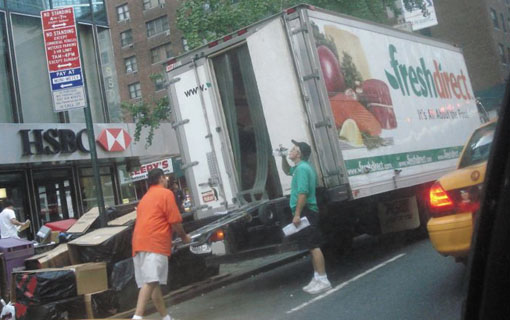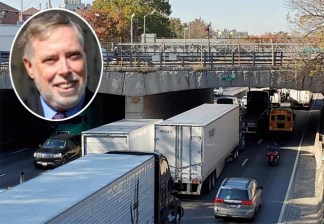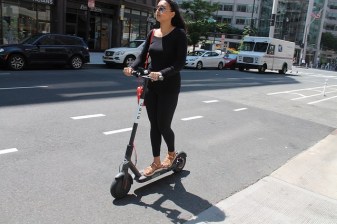Fresh Direct Builds a Grocery Empire on Free Street Space

Today’s Times marked the onset of Gridlock Alert season with a paean to Fresh Direct — the dot-com that brings New Yorkers expensive, home-delivered groceries along with idling engines, double-parking and gridlock galore.
Founded five years ago, Fresh Direct is now a $240 million a year outfit that offers us "a glimpse of the next wave of Internet commerce," wrote Times business columnist David Leonhardt. Too bad Leonhardt didn’t check his paper’s City section, which a year ago depicted the impacts of Fresh Direct trucks on Upper West Side residents and merchants:
Consider the experience of Joe Peta. Earlier this month he sat in Sude, a boutique that he and his wife own, and gazed out at one such Fresh Direct truck. Since spring, according to Mr. Peta and others, this particular truck has regularly spent several hours a day parked outside Mr. Peta’s store, on Broadway near 91st Street, where it acts as a busy, messy and noisy distribution hub for deliveries to nearby blocks. When the first truck empties, it is often replenished by a second truck; when it cannot find a spot, it sometimes double-parks. Either way, it obscures Mr. Peta’s store from the view of pedestrians across the street.
Multiply that a few hundred-fold and you’ve got a sense of Fresh Direct’s hulking presence in our neighborhoods. Plus, the big trucks compound those hellish road delays between the company’s Long Island City plant and its Manhattan client base.
It’s probably no exaggeration to say that Fresh Direct has built its financial success on its ability to fob off its social and environmental costs on the city as a whole. Yet the Times — in a column called "Economix," no less — made no mention of this subsidy.
Earlier this week Streetsblog reported stirrings of a public conversation about congestion pricing in NYC. This discussion needs to culminate in a real road pricing plan, before our streets and neighborhoods are inundated by the next wave of congestion.
Photo: jonmc on Flickr

